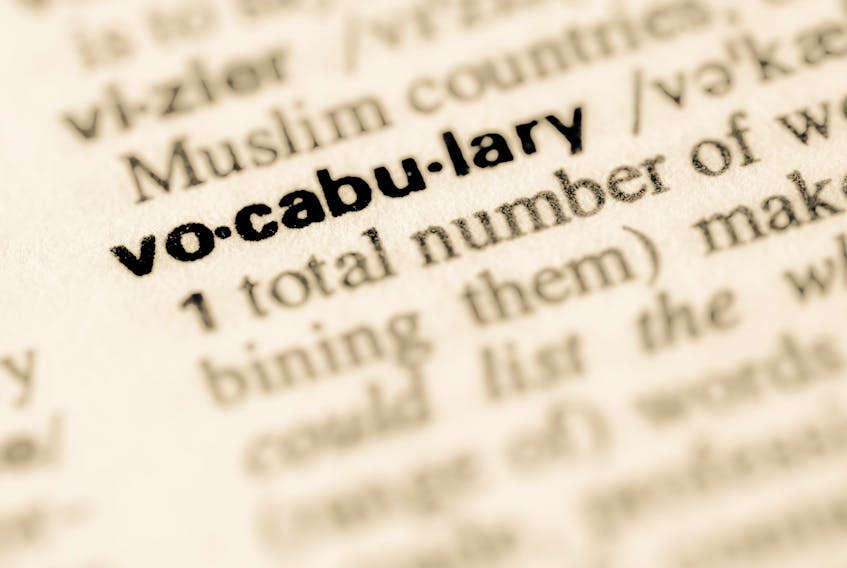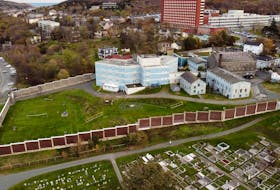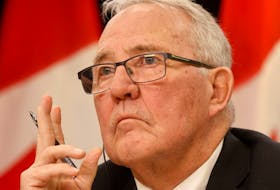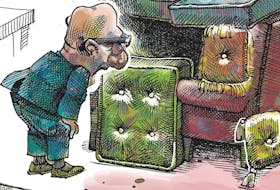
Words — I love them.
Except, of course, when they are in the hands of governments. Oh, communications professionals, why, oh why, can’t you use your powers for good?
I’ve collected a few of my least favourite words, culled from the confusing output of our provincial elected representatives.
Take, for example, the word “linkages” — I mean, does anyone even use that word outside of government releases and funding applications?
“Hey, honey, if you’re not too tired, maybe we could go up early and create some stronger linkages between our respective communities ...” (Wink, wink.)
Other words roll off the tongue smoothly, but ring hollow when you actually think about them.
I guess saying “the knowledge economy” sounds, well, knowledgeable, so I can see why politicians would use it instead of, say, “thinky-works.”
And how about “innovation?” This year’s Throne Speech in Newfoundland and Labrador had seven uses of “innovation,” 10 “innovatives” and even an “innovate” included in sentences such as, “Furthermore, the creation of InnovateNL last year will promote more efficient delivery of provincial innovation programs and services.”
Then, there’s, well, talking to people. One recent Nova Scotia news release wants “input” from “engagement sessions” to talk about “the built environment.” Buzz much?
Sometimes, the proliferation and multiplication of buzzwords can jam up your whole cranium.
What does this even mean?
“An operational plan will help to better understand where the pressure points are within our system and how things are operating ... The establishment of performance measures and targets will increase accountability and promote the effective and efficient utilization of health services.” (Name and province withheld to protect the unrepentant bafflegabists.)
Oh dear, I’ve cut myself badly. I think I’d better effectively and efficiently utilize some of those health services. Really.
And speaking of cuts, isn’t it better to just call job cuts “cuts” or “layoffs” rather than “finding operating efficiencies?” And why not say “fewer management staff,” rather than the N.L. government’s “implementing a flatter, leaner management structure.”
Other words that just might be ready for early retirement from their government jobs? How about partnering, connectedness, unparalleled, strategic, stakeholder, engagement and collaboration? (Everyone’s a collaborator now — a decade ago, a collaborator was someone who helped the Nazis in Occupied France.)
And, while we’re at it, how about everyone stops using words in ways they weren’t meant to be used?
When a government funds something, it’s called “spending” not investment. Investment implies you’re seeking a return.
One P.E.I. release last week — on road construction — had nine “invests” or “investing” or “investments,” with an apparently random “innovation” thrown in to spice things up.
Other bent words? Recognize, value and robust.
Governments are always recognizing things, too: road safety week, community leaders, you name it.
In a four-day span, the Newfoundland government “recognized” National Seal Products Day, Cystic Fibrosis Month, Ramadan, the International Day against Homophobia, Transphobia and Biphobia, “the contributions of correctional staff during Corrections Week,” Police Week and Innovation Week. Acknowledged might be a better word.
“Value” is everywhere — and how about “robust”?
It actually means “strong and vibrant” — but the New Brunswick government almost ties itself in word-knots when it talks about “robust and redundant computer systems” in its emergency management system. So, they’re big, healthy and obsolete?
New Brunswick loves the word: it has “robust and regular monitoring,” “a robust public policy framework” and “robust trade.”
Newfoundland and Labrador saw that robust and raised it by an innovative, pronouncing the province as having “A robust, innovative global supply and service sector ...”
Sometimes, the language is enough to make you do a double take.
A release I saw this week said road improvements would “help grow the middle class.” All I could imagine is a row of clay pots with freshly-sprouted workers growing out of them.
I’m hoping for change — but not expecting it.
Russell Wangersky’s column appears in 39 SaltWire newspapers and websites in Atlantic Canada. He can be reached at [email protected] — Twitter: @wangersky.









